Crawl Space Insulation: Benefits and Best Practices for Homeowners
With your crawl space tucked away underneath your home, it’s easy to overlook the importance of insulation in this hidden space. Without a barrier from the elements, your crawl space can let in pests, moisture, and drafts that impact your home comfort and health.
Installing crawl space insulation creates a cleaner, more energy-efficient home by sealing cracks, controlling heat transfer, and regulating moisture levels. In this guide, we’ll explore all the benefits of insulating this often-overlooked space and explain the importance of professional installation by pros like TRIO Heating, Air & Plumbing for long-lasting comfort.
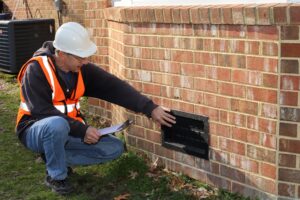
The Role of Crawl Space Insulation in Home Comfort
Even if your crawl space only takes up a small portion of your home, installing the right insulation can make a difference throughout your entire house. Insulation acts as a barrier against the outdoors, controlling moisture levels, temperature fluctuations, and unwanted drafts. Slowing the transfer of heat helps keep warm air inside during the chilly winter months and prevents hot, humid air from entering during the summer.
A well-insulated crawl space also helps keep drafts, pests, and allergens at bay by sealing gaps or cracks in the walls and floor. With protection from the outdoor elements, you’ll enjoy lower energy usage, cleaner indoor air, and a healthier environment for your entire family.
Top Benefits of Insulating Your Crawl Space
Upgrading your crawl space insulation keeps your home safe, comfortable, and cost-effective. Crawl space moisture control and reduced heat transfer can help improve everything from your energy consumption to your indoor air quality. Discover some of the top benefits of crawl space insulation below to see how a well-insulated space can make a difference in your home.
Lower Energy Bills
Crawl space insulation helps prevent heat transfer, keeping your HVAC systems from working harder than necessary to heat or cool your home. You’ll require less energy and notice savings on your monthly utility bills.
Better Indoor Air Quality
Air naturally flows from bottom to top within a home, meaning over 40% of the air you breathe comes from your crawl space. Proper insulation and sealing help prevent moisture issues, mold growth, and the entry of airborne contaminants, keeping them from affecting your indoor air quality.
More Consistent Temperatures
Crawl space insulation helps keep warm air from entering during the summer and heat from escaping in the winter, maintaining a more consistent temperature in your home throughout the seasons. You won’t have to deal with chilly floors on winter mornings or unbearably hot rooms during the summer.
Moisture and Mold Prevention
Proper insulation controls the moisture level inside your crawl space, reducing the risk of mold, mildew, and wood rot. By keeping the space dry, it protects your home’s structural integrity, minimizes health hazards, and prevents costly repairs down the road.
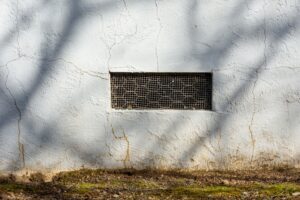
How to Know If Your Crawl Space Needs Insulation?
A poorly insulated crawl space can cause uneven temperatures, rising energy bills, and excess moisture inside your home. Performing a visual inspection and checking for the following signs that your crawl space needs insulation helps schedule service before minor problems worsen:
- Cold floors: If your floors feel extra cold when temperatures drop, a lack of insulation in your crawl space is likely allowing heat to escape from your home.
- High energy bills: Poor insulation allows for excess heat transfer, forcing your HVAC systems to work harder and use more energy to regulate the temperature in your home.
- Strange smells: Lack of insulation can allow moisture to enter your home, eventually leading to musty-smelling mold or mildew growth.
- Visible damage: Sagging or torn insulation, water stains, and wood rot in your crawl space are clear signs that you’re due for replacement or enhancements.
- Warping or creaking: Temperature fluctuations caused by poor crawl space insulation can cause wooden floors to expand and contract, resulting in warped boards and squeaking sounds when you walk on them.
Why Hire a Professional for Crawl Space Insulation?
Although it may seem straightforward, attempting to install crawl space insulation on your own can result in improper placement, moisture issues, and potentially costly future repairs. Hiring an experienced pro, like TRIO, helps ensure proper installation of your insulation, so you can enjoy long-term energy savings, consistent home temperatures, and avoid additional crawl space insulation costs down the road.
When you hire a professional for installation, they’ll check for existing issues, handle any necessary repairs, and find the best type of insulation for your space. Next, they’ll carefully install the insulation along joists and walls, secure it for long-term performance, and seal the area to prevent drafts and moisture issues. With help from a pro, you’ll boost your home’s energy efficiency, protect the structure, and create an overall healthier indoor environment.
Schedule Crawl Space Insulation with TRIO Heating, Air & Plumbing
If cold floors, rising energy bills, and mold growth are impacting your home comfort, call TRIO Heating, Air & Plumbing for professional crawl space insulation services. We’ll evaluate the condition of your crawl space insulation, determine if upgrades are necessary, and provide lasting solutions that improve your home comfort and value for years to come. With easy online scheduling, fast response times, and a team of skilled insulation experts, you can trust that we’ll get the job done right.
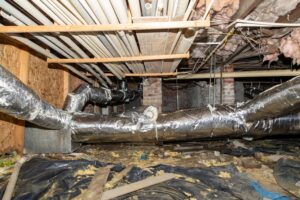
Frequently Asked Questions
What’s the best insulation for crawl spaces?
The best type of insulation depends on your climate, moisture levels, and crawl space design. The most common options include fiberglass batts, spray foam, and rigid foam panels. Our skilled insulation professionals can evaluate your space to determine the best type for lasting performance and efficiency.
Do I need both insulation and encapsulation for my crawl space?
Many homeowners benefit from both crawl space insulation and encapsulation. Insulation helps control your home temperature and energy loss, while encapsulation seals gaps and cracks to block out pests and drafts. Combining the two helps provide maximum energy efficiency, protection, and temperature control.
When should I replace or upgrade crawl space insulation?
Some of the top signs you’re due for an insulation upgrade include sagging, torn, or missing sections, visible moisture and mold, and temperature fluctuations throughout your home. If you notice any of these warning signs, contact our team for a professional insulation evaluation and replacement.
Why Installing a New AC in Winter Can Save You Money
As summer winds down and you explore places like Don Edwards San Francisco Bay National Wildlife Refuge less frequently, you’re probably not thinking about installing a new AC unit as the outdoor temperatures get cooler. However, choosing to install a new AC unit in winter provides an opportunity to save money in the summer.
Learn why winter is a smart time to install an AC unit, how to get special rebates and incentives, and the benefits of a professional AC installation in the winter months.
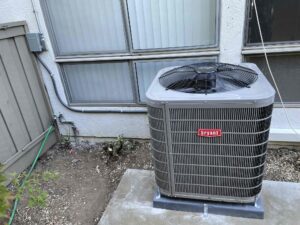
Why Winter Is a Smart Time To Install a New AC Unit
There are several benefits of installing AC in the off-season. Winter is considered the “off-season” for most AC installation companies, which makes it a smart time to invest in an upgrade. Demand for new air conditioning units is typically lower in the winter, resulting in lower prices as well. HVAC technicians have a much less hectic schedule in the winter, so there’s also a lot more flexibility when it comes to scheduling your professional AC installation.
Off-Season Discounts and Manufacturer Rebates
When it comes to getting various discounts and manufacturer rebates, there are many off-season HVAC deals to be found. The deepest discounts for winter AC installation savings are available from November through January, because demand is at its lowest during this time.
You may also benefit from lower labor costs and more flexible scheduling. HVAC contractors are typically less busy, which means you might get new air conditioner cost savings on the upfront cost associated with a new AC installation. Many major AC manufacturers offer additional price discounts and rebates in late winter to clear out older inventory and make room for new inventory.
Along with these savings, you could be eligible for the federal Energy Efficient Home Credit. This credit offers up to $3,200 annually for specific home comfort equipment, including up to $600 for qualifying central air conditioners and up to $2,000 for qualifying heat pumps. Several local incentives are available from the state of California and from certain utility companies, helping you maximize your savings even more.
How a New AC Unit Improves Summer Comfort and Efficiency
As you prepare your home for summer, a new AC unit makes this season much more enjoyable. Here’s how getting a new AC unit improves summer comfort and efficiency:
- More consistent cooling: A new AC unit distributes cold air more consistently throughout your home to help maintain a uniform temperature and eliminate hot spots.
- Better air quality: Modern air conditioners include advanced filtration that removes airborne pollutants and allergens, improving the indoor air quality in your home.
- Lower energy bills: Since newer AC units consume less energy than older models, they provide significant energy savings to reduce your energy bills.
- System improvements: Upgraded features, such as smart thermostat integration and quieter operation, make new AC units easier and more convenient to use.
- Higher SEER ratings: New AC unit models have much higher Seasonal Energy Efficiency Ratio (SEER) ratings, which means they’re much more energy efficient than their predecessors.
The Hidden Costs of Waiting Until Summer To Replace Your AC
Choosing HVAC installation in colder months may seem counterintuitive, but there are several hidden costs associated with waiting until summer to replace your AC. While a new AC has better energy efficiency regardless of when it’s installed, choosing to replace it in the summer costs more because demand during this time of year is much higher, resulting in higher prices for the unit and the installation. Buyers typically pay a premium for new AC units during peak season.
Knowing exactly when to replace your AC unit may seem tricky. However, if you have an older system or your current system is constantly breaking down, replacing it early is the best way to enjoy a cool, comfortable home when summer arrives. You’ll also pay more for emergency repairs during the peak season, so it makes sense to upgrade your AC early to prepare for the summer heat.
Benefits of Professional AC Installation in Colder Months
Why install a new AC before summer? There are several benefits to scheduling professional AC installation during the colder months.
More Convenience
Scheduling a new AC unit installation in the winter gives you access to better appointment availability that works for your busy lifestyle. You’ll also enjoy peace of mind knowing that your home is fully prepared for the hot summer months with a new AC unit that offers improved efficiency and performance.
Cost Savings
In most cases, AC manufacturers lower prices during the winter months, making the upfront cost more affordable. Labor costs may be lower in the winter due to reduced demand for air conditioners. You’ll also be eligible for various incentives like tax credits and rebates to help you save even more money.
Optimal Performance
Regardless of the time of year, installing a new energy-efficient air conditioner provides you with benefits like minimal maintenance and optimal performance. Higher SEER ratings, quiet operation, smart thermostat integration, and improved indoor air quality mean you’ll enjoy a reliable air conditioner that keeps your home cool during the peak summer heat.
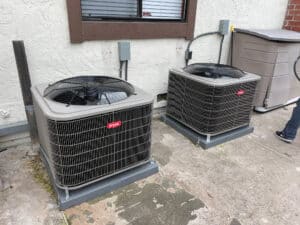
Pairing AC Installation With Other Winter HVAC Services
You can also pair your AC installation with other winter HVAC services, such as a furnace inspection and tune-up. If your furnace is aging and needs to be replaced, winter is an ideal time to upgrade to a new heat pump that provides both energy-efficient heating and cooling in one unit.
You’ll also get more streamlined service and better scheduling to get your heating and cooling needs met in one visit. Addressing your heating needs in the winter is the best way to ensure your system is clean and properly tuned to meet the demands of cold temperatures. Installing a new AC unit at the same time provides the same benefits for hot summer temperatures.
Schedule Your Winter AC Installation With TRIO Heating, Air, & Plumbing
The experts at TRIO Heating, Air, & Plumbing are available for your winter AC installation in the Greater San Francisco Bay area. Choosing to install a new air conditioner in the winter offers a range of benefits, including improved energy efficiency and financial savings. Contact us today to schedule your AC installation or another HVAC service with our company.
What Is Air Scrubbing and How It Improves Indoor Air Quality
What is Air Scrubbing? Understanding the Benefits for Indoor Air Quality
Air scrubber for HVAC systems is a device that’ll improve your indoor air quality (IAQ). It’s an advanced filtration system that minimizes contaminants in your air when the HVAC fan is turned on.
If you’re wondering how air scrubbers work or how to get one installed, call TRIO Heating, Air, and Plumbing today. Our HVAC technicians are based out of San Jose, CA, and we serve Menlo Park, Pacifica, Santa Clara, Sunnyvale, Palo Alto, and other surrounding communities. If you’re in the Greater San Francisco Bay Area and want better indoor air quality, contact our team today to learn your options or to schedule a consultation.

What Is Air Scrubbing?
Depending on where you live in Santa Clara County, the outside air quality may be quite poor, with heavy pollution and high ozone, especially when California wildfires run rampant in the area. Installing HVAC air purification in your home helps immensely with the indoor air quality, because your indoor air gets pulled through your regular air filters, then hits additional technologies to kill bacteria, neutralize pollutants, and further remove smoke and debris from the air.
Air scrubbing is another term for whole-house air purification. You can have this type of advanced air filtration system installed inside your ducts to “clean” the air using state-of-the-art technology to destroy pollutants and remove even the tiniest pollutants, odors, dust, and allergens.
How Do Air Scrubbers Work with HVAC Systems?
Air scrubbing goes beyond your average air filtration system, using light waves and ionizing processes to neutralize contaminants and remove them permanently from your indoor air. They work by:
- Step 1: Drawing air into the air scrubber unit, which is usually installed inside your air ducts.
- Step 2: Pulling air through a HEPA filter, and possibly a second carbon filter to remove larger particles like hair, pet dander, dust, and even odors.
- Step 3: Air passes through a UV light that produces molecules that neutralize viruses, bacteria, and harmful contaminants. These molecules travel through your home, cleaning the air and surfaces.
- Step 4: An ionizer electrically charges ions in the air that make debris attract to surfaces, pulling them out of the air.
This multi-stage process makes your indoor air clean, safe, and healthy to breathe.
Common Indoor Air Quality Issues Air Scrubbers Can Solve
Here are some of the most common IAQ issues air scrubbers solve:
- Allergens and asthma triggers: Dust, pollen, pet dander, and other allergy triggers are pulled from the air, helping to reduce symptoms like itchy eyes, congestion, and a runny nose.
- Mold spores: Local humidity is high, so the more mold spores caught and neutralized by your air scrubber, the lower the chances of mold growth and illness due to exposure.
- Volatile organic compounds (VOCs): VOCs are harmful chemicals released when paint, furniture, and cleaning supplies off-gas, releasing them into the air. Scrubbers capture and remove these harmful chemicals, so you don’t inhale them.
- Smoke and bad smells: Odors like tobacco smoke and cooking smells are neutralized by air scrubbing technology, keeping your home smelling fresh and clean, even if you burn dinner.
- Bacteria and pathogens: Air scrubbers stop bacteria, viruses, and other microorganisms from circulating through your home, keeping you and your family healthier.
Air Scrubber vs. Air Purifier: What’s the Difference?
You may be wondering whether an air scrubber is the same thing as an air purifier. While they have similar jobs, comparing an air scrubber vs. an air purifier is like comparing a vacuum with a broom. They both clean the floor, but one removes debris much more effectively. An air scrubber is the advanced version of a purifier.
- Air purification systems often use high-efficiency particulate air filters, or HEPA filters, to remove dust, pollen, mold, bacteria, and many other airborne particles.
- Air scrubbers, on the other hand, incorporate UV lights and ionizers, along with filtration to remove even more pollutants from the air, including gases, smells, and bacteria.
TRIO offers many indoor air quality solutions. Schedule an in-home consultation today to find out which option is best for you.

Benefits of Air Scrubbers for Your Home and Health
Health Benefits
When you reduce airborne contaminants in your home, you minimize allergens, volatile chemicals, and other particles. Pollutants and pathogens are broken down at the molecular level to enhance your indoor air quality. This is especially helpful to infants, the elderly, and anybody with allergies, asthma, or respiratory disorders.
Improved HVAC Performance
As long as you continue to schedule regular HVAC maintenance and keep air filters clean, air scrubbers will reduce the strain on your heating and cooling system by reducing the pollutants that can accumulate inside the system and on the coils. This will improve its performance and reduce your energy use.
Potential Rebates
California offers many rebates and tax incentives to homeowners looking to improve their home’s efficiency. You can check the state Climate Action site for HVAC upgrade incentive opportunities, and look up whether your home qualifies for additional rebates when upgrading to an energy-efficient HVAC.
Why Professional Air Scrubber Installation Matters
Air scrubber installation should only be done by a qualified, professional HVAC technician. Otherwise, it could be ineffective, or worse, a safety hazard. At TRIO, we have all the tools, experience, and training required to put your new air scrubber in safely.
When choosing an air scrubber, it’s important to consider factors like:
- The local air quality, including the amount of pollution in and around your home.
- Each system’s manufacturer’s warranty.
- Your home’s layout and ductwork setup.
- Your household’s health, and whether you have specific concerns to address.
Our contractors will correctly position and mount the air scrubber, attach it firmly within your ductwork, and test everything to ensure proper operation. Then they’ll install the filters and give one final thorough evaluation before leaving.
To learn more about putting an air scrubber in, you can count on our team to give you all the info you need after a consultation. We’ll go over costs, timelines, and answer all your questions so you get the right air purification system for your needs.

Schedule Air Scrubber Services with TRIO Heating & Air
At TRIO Heating and Air, we always use high-quality products and take the necessary time and care required to do the job right the first time. If you’re looking for a reliable HVAC company to install your air scrubber, contact us at (415) 306-8727 or send us an email through our online form, and our local indoor air quality experts will set your consultation appointment as quickly as possible.
Common Problems Caused by Poor Crawl Space Insulation
When pest problems, rising energy bills, and uneven temperatures pop up, many homeowners are quick to assume their HVAC systems or windows are to blame. However, the actual culprit could be the crawl space insulation. Poor insulation in your crawl space can lead to moisture buildup, heat loss, and mold growth, all of which can negatively impact your home, health, and wallet.
Explore the most common crawl space insulation problems to help you know when to call an experienced professional for insulation inspection, replacement, or repair.

Why Crawl Space Insulation Matters
Properly installed insulation is the key to a comfortable, healthy, and energy-efficient home. The top benefits of proper crawl space insulation include:
- Controlled moisture levels: Insulation helps regulate the moisture levels within your crawl space, preventing condensation, mold growth, and wood rot.
- Pest prevention: A properly insulated crawl space is more secure, keeping pests like rodents and bugs out of your home.
- Reduced energy consumption: Crawl space insulation improves energy efficiency by regulating the temperature in your home, which reduces the strain on your HVAC system.
- Enhanced air quality: Crawl space insulation prevents mold and mildew growth in your crawl space, reducing the risk of spores, allergens, and odors from circulating in your home.
- Better indoor comfort: Insulation helps regulate temperatures throughout your entire home by preventing heat from escaping your crawl space.
Common Problems Caused by Poor Crawl Space Insulation
Poor insulation in your crawl space can cause problems throughout your home. From rising monthly bills to potential health hazards, discover the most common issues homeowners deal with below.
Uncomfortable Temperatures
Without proper insulation, your crawl space stays chilly during the cold winter months. As heat naturally travels toward colder areas, the temperatures inside your home may drop, leaving you with cold floors and rooms that won’t stay warm. In the summer, the reverse happens, as heat from the crawlspace seeps into your home, causing rising temperatures.
Moisture and Mold
Lack of insulation makes your crawl space more prone to condensation, leaks, and rising humidity, which can lead to moisture problems and mold growth. Damp conditions create an ideal environment for mold and mildew to thrive, causing health problems, structural damage, and musty odors to circulate throughout your home.
Energy Waste
With heat escaping from your crawl space, your HVAC system has to work harder to keep your home at a comfortable temperature. Drafts, air leaks, and temperature changes cause your heating and cooling systems to run longer, resulting in higher energy consumption and utility bills.
Pest Infestations
Without insulation blocking their path, rodents, insects, and other pests find entry points to enter your crawl space. These creatures quickly make themselves at home, breed, and cause damage to wiring, wood, and the surrounding area. An infestation can also lead to health problems because pests spread bacteria and allergens around your home.

Warning Signs You Have Crawl Space Insulation Issues
Many homeowners are unaware that poor crawl space insulation may be contributing to their home and health issues. Some of the top signs you crawl space insulation isn’t performing properly include:
- Cold floors: If you notice your floors get especially cold in the winter, poor crawl space insulation may be causing cold air to seep up into your living spaces.
- High utility bills: Your HVAC system has to work harder to regulate the temperature in your home, resulting in higher energy bills.
- Unpleasant odors: Mold growth and pest infestations due to poor crawl space insulation can cause musty or foul smells in your home.
- Pest problems: Mice, rats, bugs, and other creatures often take up residence in poorly insulated crawl spaces, leading to droppings, home damage, and health concerns.
- Rising humidity: Inadequate insulation in your crawl space can result in moisture issues and excess condensation.
- Sagging floors: Sagging or bouncy-feeling floors are one of the top signs of crawl space moisture problems.
- Drafty rooms: Inadequate insulation often lets drafts into your home, causing uneven temperatures and cold spots.
How Poor Crawl Space Insulation Affects Indoor Air Quality and Energy Efficiency
Some of the most significant effects of poor crawl space insulation in your home are poor indoor air quality and reduced energy efficiency. Without a boundary preventing heat transfer and moisture intrusion, your HVAC system has to work overtime, and airborne allergens, spores, and irritants are more likely to spread throughout your home.
When your crawl space insulation isn’t performing correctly, you’ll often notice uneven temperatures, more frequent HVAC repairs, and high energy bills. There’s nothing preventing heat from transferring in and out of the space, so your HVAC system has to work harder to reach your desired temperature, causing increased energy consumption and higher utility costs.
Without proper sealing, poor crawl space insulation also affects your air quality. Rising moisture levels, mold growth, and pest problems can cause bacteria, spores, and other airborne irritants to circulate around your home. As these contaminants enter your living spaces, they can cause respiratory issues, unpleasant odors, and worsening allergy symptoms.

Benefits of Professional Crawl Space Insulation Services
Always choose a trusted insulation installation pro for reassurance that your crawl space insulation is installed properly. They have the tools and expertise to calculate the correct amount of coverage, eliminate gaps, and find the right type of insulation for your home. With professional installation, you’ll have peace of mind that your home is safe from moisture issues, pest problems, and unnecessary energy waste.
Insulation professionals also perform inspections to determine the condition of your crawl space insulation and identify any potential problems. A thorough assessment helps you catch issues early and replace your crawl space insulation to protect your home, health, and comfort. TRIO Heating, Air & Plumbing offers rebates and coupons that help you save on insulation services.
Schedule Crawl Space Insulation Services With TRIO Heating, Air & Plumbing
Protect your home and improve comfort with crawl space insulation services from TRIO Heating, Air & Plumbing Our skilled assessors evaluate your crawl space, recommend the most effective insulation upgrades, and quickly install them to prevent energy loss, pest infestations, and uncomfortable temperatures.
Call us or book online to schedule your appointment in San Jose or the surrounding areas today. We proudly serve homes and businesses throughout the Greater San Francisco Bay Area.
How To Spot Hidden Plumbing Leaks in Your Home
The last thing you want to encounter after a great day at Happy Hollow Park & Zoo in San Jose, CA, is a plumbing leak. Knowing how to spot hidden plumbing leaks is key to addressing the problem early and preventing further damage. The team of experienced plumbers at TRIO Heating, Air & Plumbing has some tips about why it’s important to catch leaks early, common signs of hidden plumbing leaks, and more.
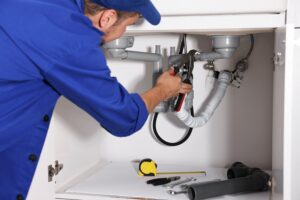
Why It’s Important To Catch Plumbing Leaks Early
Not only is catching leaks early the best way to prevent water damage from leaks, but there are many other reasons that catching this issue early is so important.
- Catching leaks early prevents water waste, which is better for the environment and may help to reduce your monthly water bill significantly.
- Finding and addressing the signs of a hidden plumbing leak early saves you money by helping you avoid more extensive and costlier repairs if the leak remains undetected.
- Certain leaks may contaminate your home’s water supply, so catching them early is the best way to make sure your water is clean and safe.
- Early detection also helps prevent mold growth that can lead to a variety of health issues.
Common Signs of Hidden Plumbing Leaks
Here’s how to tell if you have a water leak and some common hidden plumbing leak warning signs to look for.
- Sudden water bill increase: If your water bill is much higher than usual without a change in usage, there’s a good chance you have a hidden plumbing leak.
- Musty odors: Unpleasant, musty odors are often a sign of mold, which could be caused by leaky plumbing.
- Visible water stains: Discolored walls, ceilings, or floors with yellow or brown stains, or wet spots that are located around appliances, pipes, or plumbing fixtures, are a common sign of a hidden water leak.
- Peeling or bubbling paint: If your paint or wallpaper is bubbling or peeling, it may be due to water damage from plumbing leaks inside your walls.
- Low water pressure: A sudden, unexplained drop in water pressure is another common sign of a hidden plumbing leak.
- Foundation issues: Cracks or wet and/or warm spots on your floor are two common slab leak symptoms that may mean there’s a hidden leak present underneath your home’s foundation.
Top Places Where Hidden Leaks Happen in the Home
Knowing the top places where leaks occur is one of the best ways to understand how to find water leaks in your house.
- Pipes, particularly those behind walls or under sinks, are common areas where hidden leaks occur.
- If your home has hard water and you have a water softener, check near the drain connection and other fixtures attached to it.
- A leak may come from your toilet tank, its flush valve, or the toilet plumbing connections.
- Water pooling around your water heater can indicate a hidden leak in your hot water system.
- Loose or damaged connections and hoses attached to dishwashers, refrigerators, and washing machines are other common sources of a hidden plumbing leak.
How to Find Water Leaks in Your House
Remember these leak detection tips to help you find water leaks in your house.
- Visually inspect under sinks, near toilets and tubs, and around appliances to look for signs of leaks.
- Locate your water meter and check for movement after you turn off all faucets and appliances.
- Check for signs like water stains, bubbling paint, and musty odors, which may indicate you have a hidden plumbing leak.
- Review your water bills, and if there’s been a recent, unexplained change in consumption, consider contacting TRIO to schedule our professional leak detection services.
- Listen carefully for dripping noises or the sound of running water when appliances and fixtures are off.
- If you suspect a toilet leak, pour some food coloring into the tank, and if the bowl turns color without flushing, your toilet may leak.
The Role of Professional Leak Detection Services
While recognizing the signs of a hidden plumbing leak is helpful, using a professional leak detection service is the best way to determine the exact cause and location of the leak. This service plays a vital role in protecting your home and makes it easier to find plumbing issues early.
- TRIO’s professional leak detection service includes using advanced tools and techniques to accurately locate and identify the source of hidden plumbing leaks.
- Finding leaks early with expert leak detection keeps your home safe and helps you prevent more significant water damage.
- Scheduling routine leak inspections helps to protect your home’s plumbing system and appliances and extend their lifespan.
- Experienced plumbers know how to find plumbing leaks and can make expert recommendations about the next steps to make sure you repair and stop the leak permanently.
Preventing Water Damage With Early Detection
The sooner you can detect hidden plumbing leaks, the better you’re able to prevent serious water damage to your home and plumbing. Here are some proactive steps to take that will make finding and addressing leaks easier.
- Schedule routine inspections: Schedule routine plumbing inspections and water leak detection services to help you find leaks early before they turn into costly repairs or cause major damage.
- Use water leak detectors: Place water leak sensors under areas like sinks, near appliances and water heaters, and in your basement so you’re alerted to a leak as early as possible.
- Try smart water detectors: Consider purchasing a Wi-Fi-enabled device that sends leak alerts directly to your smartphone, so you always know when a leak is present, even when you’re not home.
- Pay attention to water consumption: Monitor your household’s water consumption and check your water bill each month to look for sudden spikes, which could mean you have a hidden leak.
- Perform DIY inspections: Regularly look under sinks, near appliances, toilets, and tubs, and anywhere else that plumbing is present, to help you locate water leaks or pooling water as soon as possible.

Schedule Leak Detection or Repair With TRIO Heating, Air & Plumbing Today!
TRIO Heating, Air & Plumbing is a reliable provider of plumbing and leak detection services and water leak repair near you. Our team proudly serves customers in the greater San Francisco Bay Area with a commitment to excellence and community well-being. To schedule a professional plumbing inspection or leak repair service, contact us today!
Essential AC Maintenance Tips To Keep Your System Running Smoothly
With summer highs averaging 70°F, a reliable air conditioner is key to living comfortably in the Bay Area. Regular AC maintenance helps your system run smoothly, keeping your home cool while avoiding costly repairs.
Explore essential AC maintenance tips, learn ways to improve AC efficiency, and discover signs it’s time for professional AC maintenance from the expert team at TRIO.
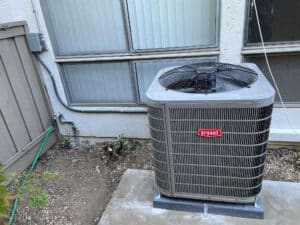
Why Regular AC Maintenance Matters
Regular AC maintenance is a reliable way to keep your air conditioner running efficiently. Schedule a professional AC check-up at least once a year, ideally in the spring before the heavy-use season begins. In addition to cleaning the system to ensure it runs smoothly, professional maintenance also helps identify and address small problems before they become costly breakdowns.
Top AC Maintenance Tips Every Homeowner Should Know
Wondering how to maintain your AC unit? These seasonal AC maintenance tips help improve AC efficiency and reduce the risk of air conditioner breakdowns.
Change Filters Regularly
ENERGY STAR recommends checking your AC filters at least once a month and changing them at least every three months. Particularly during the heavy-use season, you may need to change your filters more frequently, so monthly inspections are important to assess the amount of buildup on the filter.
Clean the Condenser
The outdoor condenser unit pulls outside air into your system, but it can also pull in dust, dirt, and other debris. While smaller particles are caught in the air filters, larger items may clog the air intake on the condenser. Improve AC airflow by regularly inspecting the condenser, removing leaves and debris, and gently washing the unit with water and mild soap.
Protect the Unit During the Off-Season
Bay Area winters are typically mild, but it’s still a good idea to protect your AC when not in use. If you don’t use the system during the winter, consider turning it off and placing a cover over the outdoor unit to protect it from rain, dust, and debris.
Seasonal AC Maintenance Checklist
When your AC pro performs seasonal AC maintenance, they’ll typically follow an air conditioner maintenance checklist:
- Check, clean, or change air filters.
- Inspect the outdoor unit.
- Clean indoor and outdoor condenser coils.
- Check refrigerant levels.
- Inspect all electrical connections.
- Clean and lubricate mechanical parts.
- Clear the condensate drain line.
How To Improve AC Efficiency at Home
Learning how to improve AC efficiency at home helps extend the AC’s lifespan, save you money, and keep your home more comfortable.
Choose the Right AC Size
Correct AC sizing is key to improving efficiency. If your unit is too large, it may short-cycle as it tries to maintain the proper temperature. If the unit is too small, it may run constantly and burn out the fans. A qualified AC pro can help you find the best size for your home and energy needs.
Use a Programmable Thermostat
One of the biggest energy drains for an AC system is running it when you’re not home. A programmable thermostat makes it easy to reduce AC use when you’re away and when overnight outdoor temperatures drop. A smart thermostat automatically adjusts to temperature and occupancy levels.
Maintain Proper Airflow
Furniture and other items in front of vents force your AC to work harder to move air through your home. Check for items blocking the indoor vents or the intake vent for the outdoor condenser unit.
Insulate the System
Even if your AC unit is functioning properly, cold loss can still occur through your coolant lines, vents, and other components of the system. Make sure AC lines are insulated to minimize energy loss and inspect for leaks in your vents or other areas where air may escape.
Insulating your home and using Energy Star efficient windows help reduce energy loss and may even qualify you for energy rebates, depending on local legislation.

Signs Your Air Conditioner Needs Maintenance
If you notice any of the following signs, it’s time to call for routine AC service.
Loud Noises
When your air conditioning system is running properly, it usually produces a quiet, consistent sound. However, an air conditioner in need of maintenance may make loud and unusual noises, such as clanging, whirring, whining, or clunking. If your AC makes odd or new noises, it’s a sign to call for an AC inspection.
Bad Smells
A broken AC may produce a musty, burning, or sweet, chemical-like smell. Musty smells usually indicate mold or mildew, which can affect indoor air quality and should be cleaned out by a professional.
A burning or chemical smell needs immediate attention. Burning usually means a fire hazard, while a chemical smell can indicate a toxic refrigerant leak. If you smell either of these things, turn off your AC, evacuate the home, and call a pro for repairs.
AC Turning Off and on Again
A typical AC cycle includes about 15 to 20 minutes on, followed by about 15 to 20 minutes off. Depending on your unit and the temperature in your home, this may be slightly shorter. However, if your AC is turning rapidly on and off (with cycles lasting less than 10 minutes), this can indicate AC short cycling and means the unit is due for inspection.
Rising Energy Bills
If you’ve noticed a jump in your utility costs, it’s a good sign that it’s time for AC maintenance. A gradual rise may indicate wear and tear, while a sudden spike can mean a broken component. Maintenance can help get your energy bill back where it belongs.
The Benefits of Scheduling Professional AC Tune-Ups
There are many benefits to professional AC tune-ups, including reducing AC repair costs, boosting home safety and indoor air quality, and extending AC lifespan.
Avoid Costly Repairs
Unaddressed AC issues can quickly escalate into more significant problems, resulting in costly repairs. Calling an AC pro at the first sign of a problem is the best way to prevent a major AC breakdown and keep your home cool.
Improve Home Safety
While air conditioners are generally very safe, even the best units can become a problem when worn or damaged. Regular AC maintenance helps identify potential issues, such as fire hazards and refrigerant leaks, before they become a risk to your family. Routine cleaning and maintenance also help reduce mold and mildew, improving the air quality in your home.
Prolong AC Lifespan
Modern air conditioners typically have a lifespan of 15 to 20 years when well-maintained. Routine professional AC maintenance reduces wear and tear, helping you get the most out of your air conditioner.

Book an AC Maintenance Appointment With TRIO Heating, Air & Plumbing
Keep your AC running smoothly and avoid costly repairs with annual professional maintenance. Our team of licensed pros at TRIO Heating, Air & Plumbing provides expert tools and great customer service to your Bay Area home. Contact us today to book your next appointment and keep your air conditioner working at its best.
